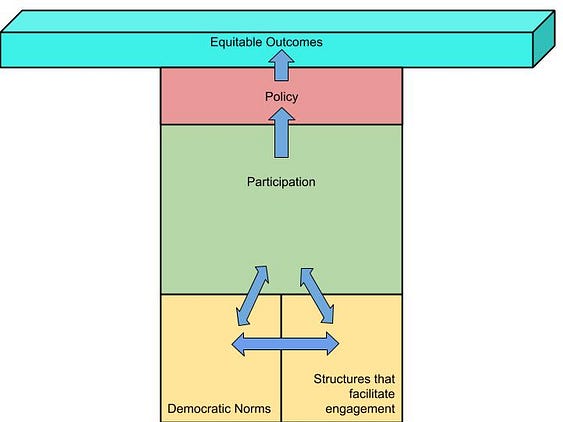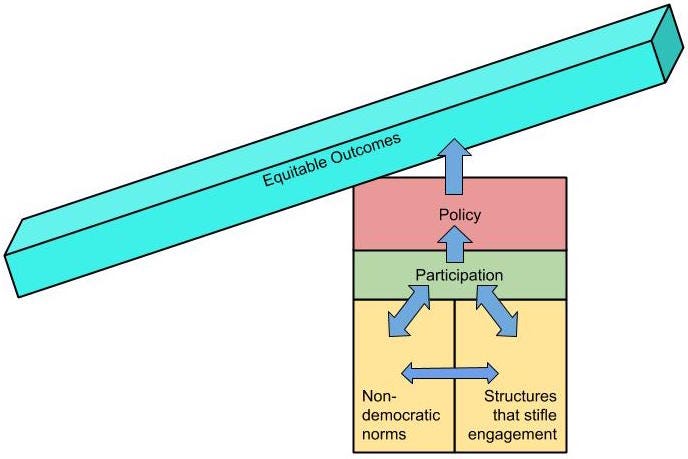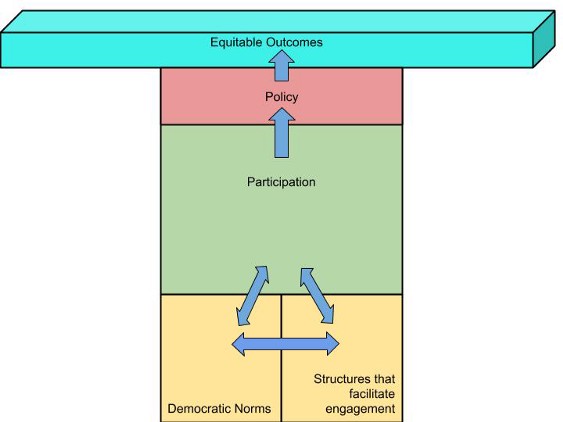Improving Democracy Starts with its Citizens
How a focus on the citizen-centric process of democracy leads to better outcomes
By Emely Anico, Nora Howe, Brandon Klugman, Sydney Menzin, Sarah Nicita, Scott Warren
Over the last few months, several of us at Generation Citizen, with the help of Brown University students, have been conducting research centered on the practice of democracy. Specifically, we have been investigating whether the current state of democracy is at an historic precipice and researching the relationship between participation and economic and social outcomes. Based on our initial findings, we are investigating examples and case studies of effective democratic practices occurring throughout the world, in an attempt to create a pro-democracy platform and agenda.
While the research is ongoing, we have attempted to distill our argument into a clear thesis: to improve democracy, it is critical to focus on the democratic process itself, with an aim of robust citizen engagement, rather than solely a focus on outcomes.
We welcome feedback on our argument as we continue the work and research. In the coming months, we look to bring a cross-collaboration of researchers and practitioners together to help us continue the conversation and push our thinking.
It is almost cliché to say that our democracy is at risk. In the United States, Donald Trump’s ascendancy to the presidency has provoked an existential inward examination of our systems and institutions, triggered by the essential question of how an inexperienced government leader who continually defied so many political conventions became the leader of the free world.
But the very premise of democracy at risk is not purely American: citizens are questioning the system of governance around the world. The shock of Brexit caused similar angst across the European Union, with incredulity that such an electoral result could actually occur. These “unprecedented” examples of democracy at risk have become more the norm than the exception in in recent years. The promising spark of democracy in the Arab Spring has largely failed to result in lasting change. Citizens initially voted against a peace accord between rebels and the government in Colombia. An attempted coup was followed by autocratic consolidation in Turkey. A political and economic collapse has rocked Venezuela. African leaders continually ignore term limits. European countries like France and Austria are seeing the rise and legitimization of previously fringe nationalistic leaders. The list goes on.
These catalytic events are not isolated, nor are they random. Amidst an increasingly interconnected world, and massively increasing economic and social inequality, citizens are questioning whether democratically-elected governments can work to serve their interests. Why should citizens entrust in institutions that seemingly exacerbate problems, rather than solving them? Events like Trump’s election and the Brexit vote did not happen without millions of people voting in their favor, desperately seeking a change to a status quo they felt did not serve them.
Indeed, in the United States, recent public opinion statistics have demonstrated an increasing belief that democracy is not the best form of government, with heightened numbers actually indicating support for a strong-armed leader, even in the form of a military take-over. Data from recent surveys indicate that the share of Americans who say that army rule would be a “good” or “very good” thing had risen to 1 in 6 in 2014, compared with 1 in 16 in 1995. Similarly, the data indicated that 25% of millennials do not believe democracy is the best form of government (up from 16% of young people in 1995).
But what are the ramifications of these changing beliefs? And what can we do about it?
Part of the challenge of addressing changing beliefs is actually defining democracy. A global focus on policies and outcomes has distracted us from what matters most in a democracy: the process of citizen participation. Globally, the concept of democracy as a system of governance has become intertwined with the outcomes it produces. If a government cannot provide jobs, health care, or a more equal economy, it has become the blanket fault of democracy. Logically proceeding, efforts to reform “democracy” become focused on outcomes, like concrete policies or election results. Solving our democratic dysfunctions manifests through removing structural barriers, like lessening the role of money in politics, or ensuring congressional districts are fairly drawn. These reforms are necessary. They are also insufficient. A focus on changing structures and leaders to improve democracy also runs the risk of removing agency and responsibility from citizens themselves.
Fundamentally, democracy is a process. A citizen-centric process. The goal of a democracy is not to guarantee outcomes, but rather to ensure that people are front and center driving the process. In a democracy, the people are sovereign — the highest form of political authority. Power flows from the people to the leaders of government, who hold power only temporarily. It is not sufficient if a government guarantees basic rights for its people if citizens are not actively involved in the governance effort itself. Simultaneously, a government is not sufficiently listening to citizens if it is not providing adequate and effective basic social services and focused on curbing economic inequality.
Thus, to improve democracy, we must focus on improving the process, with an end goal of robust citizen participation. To secure vigorous and healthy participation, it is incumbent to improve democratic norms and implement structures that promote active participation. A more robust and active citizenry will lead to the successful implementation of more equitable and sustainable policies. A focus on process leads to better outcomes.
As an example of this change in focus, we can look to the American healthcare system. A debate has emerged as to whether a single payer system would best provide healthcare to all. The debate, however, focuses on passing legislation, and the actions of leaders. A focus instead on ensuring that all citizens were informed on the issue, and participated vigorously in the debate, would do more to advance the issue than a focus on the opinions of elected officials, and the movement of hypothetical legislation. A democracy in which citizens are not passive actors, but the most prominent actors, will lead to the best and most representative outcomes.
Currently, however, citizens are not the most prominent actors in democracy. Assuming that democracy is defined as a citizen-centric process, statistics back up the claim that democracy is at a uniquely dangerous point in our history. Citizens are tuning out: participation is at historically small numbers across the world. A process fundamentally defined as one in which people hold the highest form of authority cannot hold if people do not participate. In order to improve participation, it is critical to ensure that democratic participation is seen as a norm, and that structures are put in place to promote, rather than hinder, citizen engagement.
In the United States, holistic democratic participation is currently not a norm. Citizens conceive of civic engagement as solely voting once every four years (although even that practice is almost an anomaly — less than 60% of eligible voters participated in the 2016 election, and less than 40% voted in the 2014 midterms). For a democracy to function, participation should be seen as an everyday activity. This does include voting. But it also includes everyday behavior that reflects democratic values, like attending town hall meetings, pressuring local officials, digesting the news, and talking to others — especially those who espouse divergent viewpoints. Intrinsic in promoting these norms is ensuring that citizens gain confidence and motivation to engage — they must feel that their efforts can make a difference. Ensuring that these norms and values are effectively taught and curated requires, in part, an education system that puts citizen empowerment and the promotion of democratic values and behavior at the forefront of its agenda.
At the same time, institutional structures must be improved to ensure citizens can participate. The role of governments should be to facilitate participation, and to ensure the ordinary citizen can be heard. This does equate to money having less of a role in politics. It also means that gerrymandering should not unfairly tear up political districts. Both practices thwart effective citizen participation. Similarly, policies should be enacted that make it easier for regular citizens to participate on an everyday basis, like automatic voter registration and increased suffrage.
These structural reforms should not be limited to voting, but to broader reforms that encourage the everyday behavior discussed above. As Adam Berinsky, a professor at MIT notes, “Put simply, no matter how low the direct costs to casting a ballot are set, the only way to both increase turnout and eliminate socioeconomic biases in the voting population is to increase the engagement of the broader public with the political world. Political information and interest, not the high tangible costs of the act of voting, are the real barriers to a truly democratic voting public.” Thus, in addition to electoral reforms, it is necessary to ensure that democratic structural reforms focus on general participation, including changes like frequent town hall meetings from elected officials, strong protection of the free press alongside measures to limit the spread of false news, and improved youth civics education.
Finally, it is undeniable that many existing structures and institutions have been cultivated with implicit or explicit oppressive overtones, whether towards race, class, sexual orientation, gender, or other groups that receive forms of discrimination. Working to reform these oppressive structures, such as an American voting system that continues to restrict minority votes, or crumbling school structures in low-income areas that demonstrate a lack of investment in certain populations, for the purposes of a more representative and active citizenry is essential for a functioning democracy.
Three case studies demonstrate the subpar results of a focus on outcomes alone, rather than the democratic process and the role of citizens in it.
In New York City, Bill de Blasio was elected mayor based on a progressive platform, focused on curbing the economic inequality that has plagued so many. De Blasio came into office with a bevy of policy initiatives. He attempted to implement universal Pre-K, raise the minimum wage, increase tax rates on the wealthy, and provide more affordable housing, among other goals. As he seeks a second term, many of his priorities remain unfulfilled. Relatedly, De Blasio’s recent primary election inspired only 14% turnout — one of the lowest voter participation rates in New York City since World War II.
Whereas De Blasio’s singlehanded focus on economic inequality may result in some good policy, he will not succeed without a strong citizen backing. Nor will his approach be sustainable after his term. De Blasio has seemingly failed to realize that pursuing policy outcomes without an accompanying focus on citizen engagement is less likely to solve the city’s problems than an approach that sees civic engagement itself as the first piece of every solution. One can imagine that were De Blasio to campaign on ending income inequality while simultaneously inspiring 80% turnout in New York City, the results would be drastically different. He would have a strong mandate, and citizens would be fully engaged to help pursue the agenda.
In another example, recent efforts to implement more strident gun control measures on the national level have fallen short. The temptation is to blame elected officials, who are not heeding the wishes of a public, of which 80% are in favor of more background checks. Or to blame a political system in which money and lobbyists play too much of a role in gun debate. The reality, however, is that gun-rights advocates are much more active in the political arena than those pushing for gun control legislation. Rather than bemoaning elected leaders, a focus on a process in which more of these 80% of citizens are actively engaged would give gun control legislation a better chance.
We can also look internationally to Rwanda to learn about the consequences of an outcomes-based approach to democracy, without adequate attention on citizen participation. After the genocide in 1994 tore the country apart, Paul Kagame, since becoming president in 2000, has presided over a technocratic, reform-oriented regime. The results have been impressive — Rwanda has some of the best economic growth on the continent, and has seen improvements in public institutions, like schools, healthcare, and roads. However, there is no norm of robust citizen involvement, or structures that facilitate engagement. A recent election saw Kagame win re-election with over 99% of the vote. Kagame has posited that opposition, and citizen engagement, would hinder his pro-growth agenda.
The notion of a “benevolent dictator,” resulting in robust economic growth without true democratic opposition, is not solely a Rwandan concept. The East Asian tigers of Taiwan, Singapore, China, and South Korea similarly pursued pro-growth economic agendas in the 1990’s while simultaneously stifling any whiff of opposition. The result, however, is not sustainable. Recent research has demonstrated that despite the Asian countries’ economic success, the tigers have seen immense poverty, increasing income disparities, and environmental degradation. Likewise, while Rwanda’s economic indicators have been positive, a crackdown on free speech hinders public expression. Focusing solely on outcomes is unsustainable, and creates states dependent on individual leaders.
Alternatively, a focus on the process is both empowering to individuals and effectively leads to equitable outcomes. Studies have demonstrated that when more lower-income Americans participate, their needs are taken into account: there is a greater increase in spending on welfare and elected officials pay closer attention to the economic concerns of this demographic. A focus on process does not come at odds with outcomes. Rather, the better the process, the better the outcomes.
A focus on the process will not automatically solve all problems either, of course. By focusing on citizen voice, income inequality will not evaporate, racial tensions will not be alleviated, and climate change will not abate. Democracy as a process, however, is necessarily inefficient, messy, and incremental. Ensuring that citizens are front and center in this process, rather than focusing on leaders and structures, will ultimately lead to more sustainable and equitable outcomes. However long it may take.
It is tempting to bemoan the death of democracy as a fait acompli. Or to look for inspiring leaders who can take us out of the abyss. Instead, we should look inward. If we are serious about saving our democracy, we must improve the very process, and ensure that the end goal is robust citizen voice.
Visuals
The supplementary diagrams below are intended to help demonstrate the concepts discussed above.
Robust participation supports sustainable, equitable outcomes:

Robust participation can support strong policy, and these factors together lead to equitable outcomes that are sustainable. Robust participation is influenced by and exerts influence on democratic norms and structures that facilitate engagement. This diagram is meant to demonstrate that participation is at the foundation of equitable outcomes — it helps them to occur, and ensures they are sustainable.
Limited participation leads to outcomes that are not sustainable:

When participation is limited, which can be due to non-democratic norms and oppressive structures, policy does not lead to stable, equitable outcomes.
